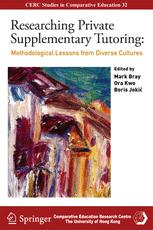

Most ebook files are in PDF format, so you can easily read them using various software such as Foxit Reader or directly on the Google Chrome browser.
Some ebook files are released by publishers in other formats such as .awz, .mobi, .epub, .fb2, etc. You may need to install specific software to read these formats on mobile/PC, such as Calibre.
Please read the tutorial at this link: https://ebookbell.com/faq
We offer FREE conversion to the popular formats you request; however, this may take some time. Therefore, right after payment, please email us, and we will try to provide the service as quickly as possible.
For some exceptional file formats or broken links (if any), please refrain from opening any disputes. Instead, email us first, and we will try to assist within a maximum of 6 hours.
EbookBell Team

4.7
36 reviewsPrivate supplementary tutoring, widely known as shadow education because of the way that it mimics mainstream schooling, has greatly expanded worldwide. It consumes considerable family resources, provides employment for tutors, occupies the time of students, and has a backwash on regular schools. Although such tutoring has become a major industry and a daily activity for students, tutors and families, the research literature has been slow to catch up with the phenomenon. The topic is in some respects difficult to research, precisely because it is shadowy. Contours are indistinct, and the actors may hesitate to share their experiences and perspectives. Presenting methodological lessons from diverse cultures, the book contains chapters from both high-income and low-income settings in Asia, Caribbean, Europe and the Middle East. Separately and together, the chapters present valuable insights into the design and conduct of research. The book will assist both consumers and producers of research. Consumers will become better judges of the strengths, weaknesses and orientations of literature on the theme; and producers will gain insights for design of instruments, collection of data, and interpretation of findings.
The editors: Mark Bray is UNESCO Chair Professor in Comparative Education at the University of Hong Kong. Ora Kwo is an Associate Professor in the Comparative Education Research Centre at the University of Hong Kong. Boris Jokić is a Scientific Associate in the Centre for Educational Research and Development at the Institute for Social Research in Zagreb, Croatia.